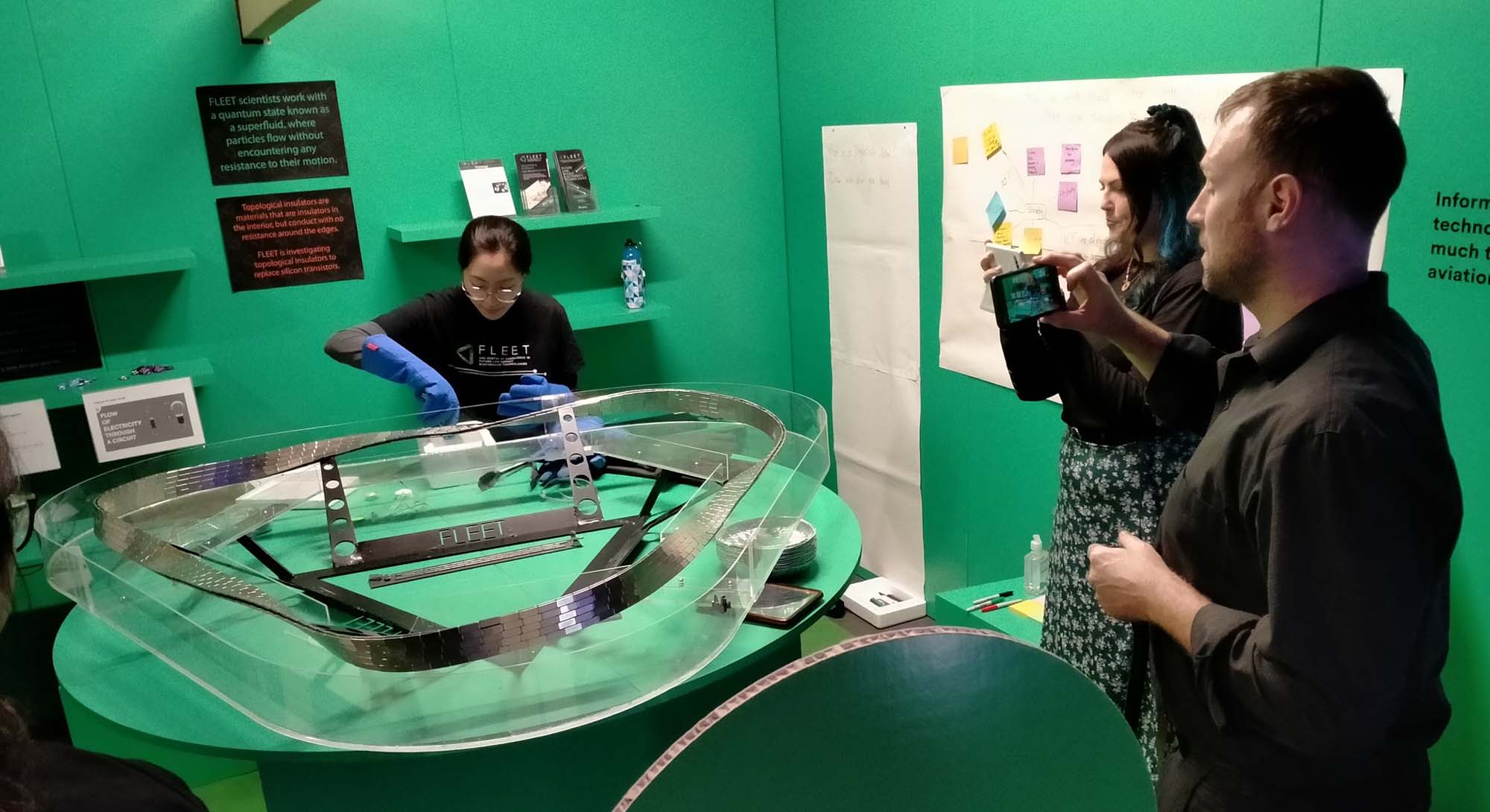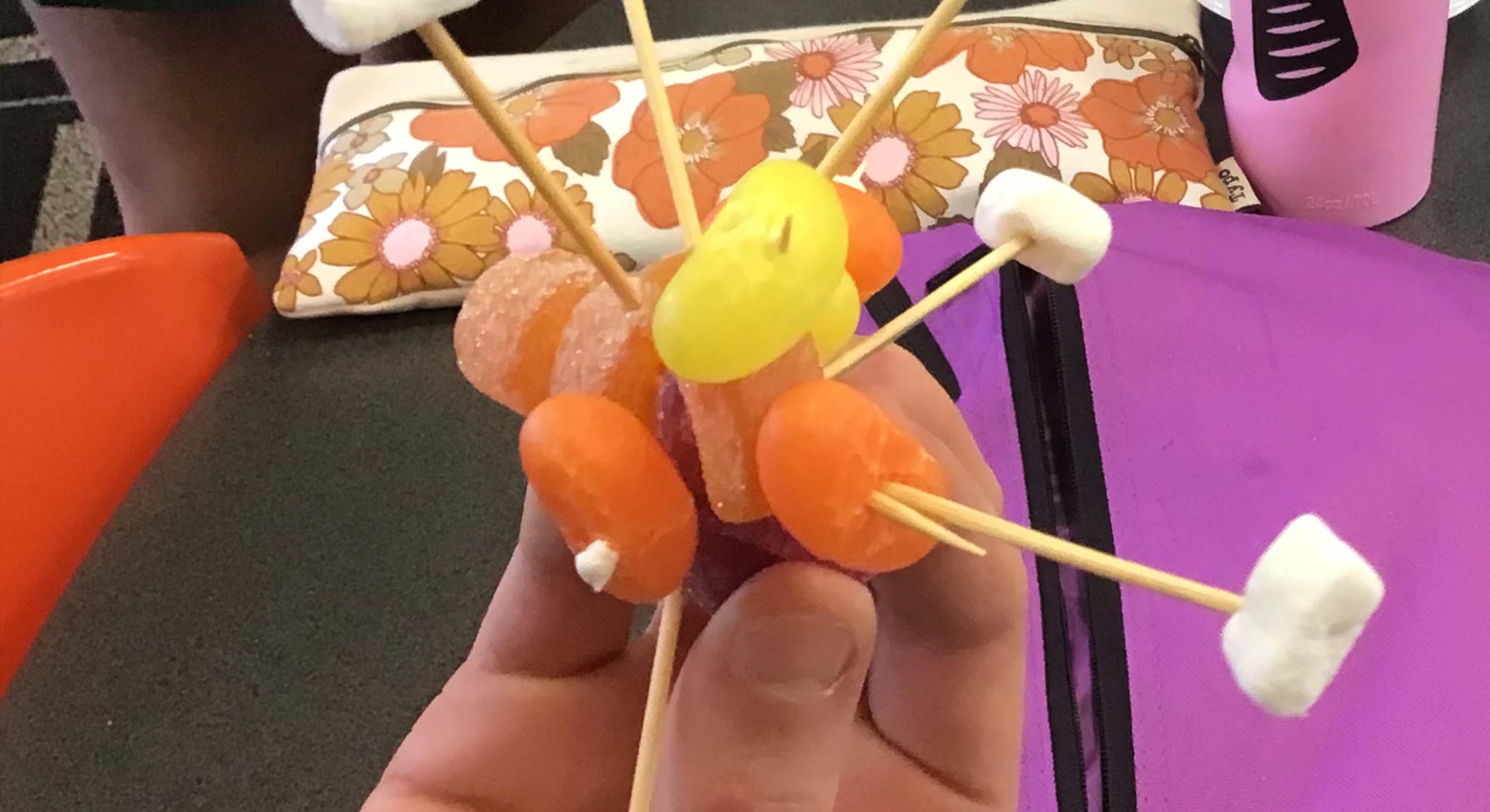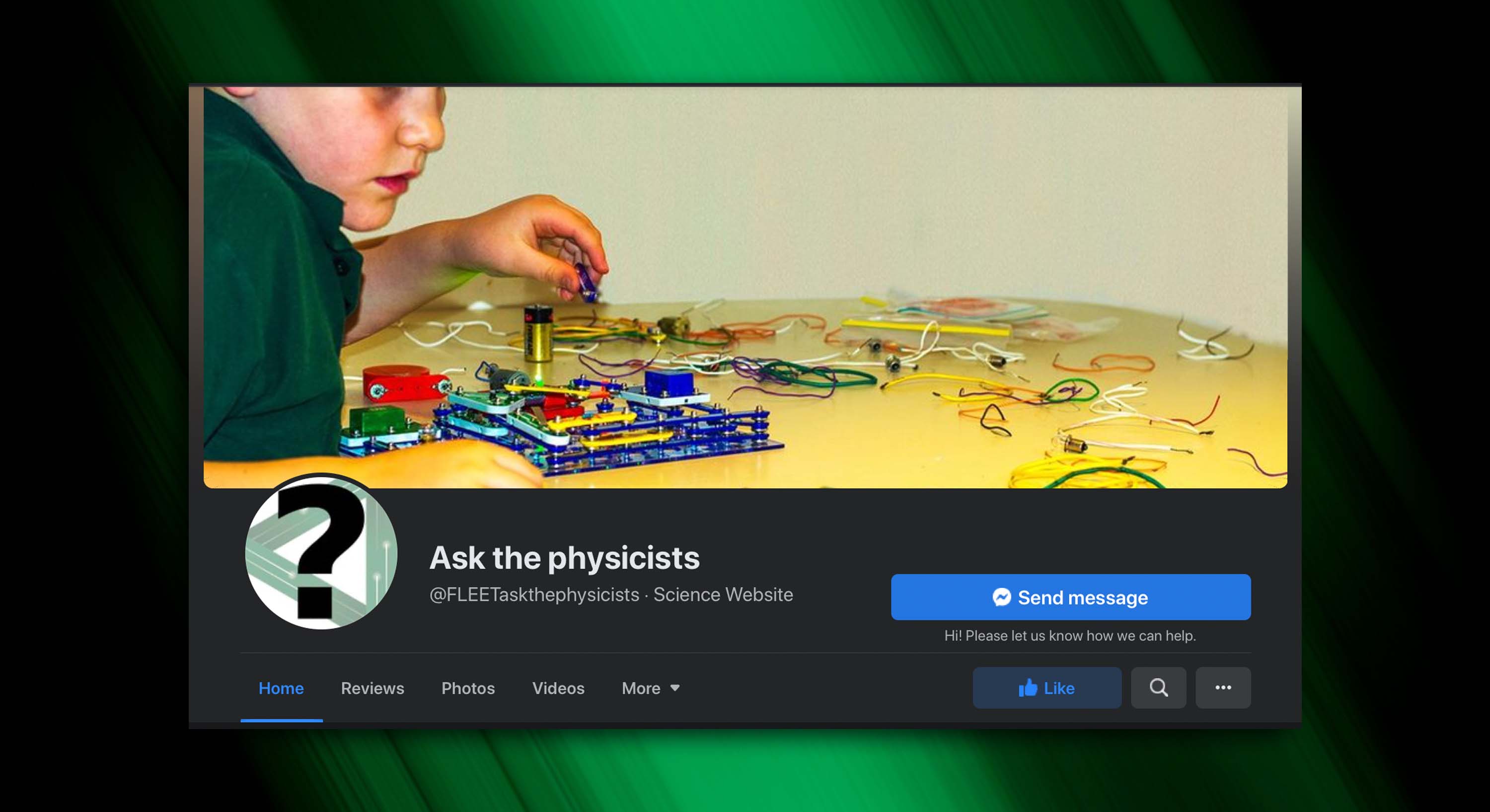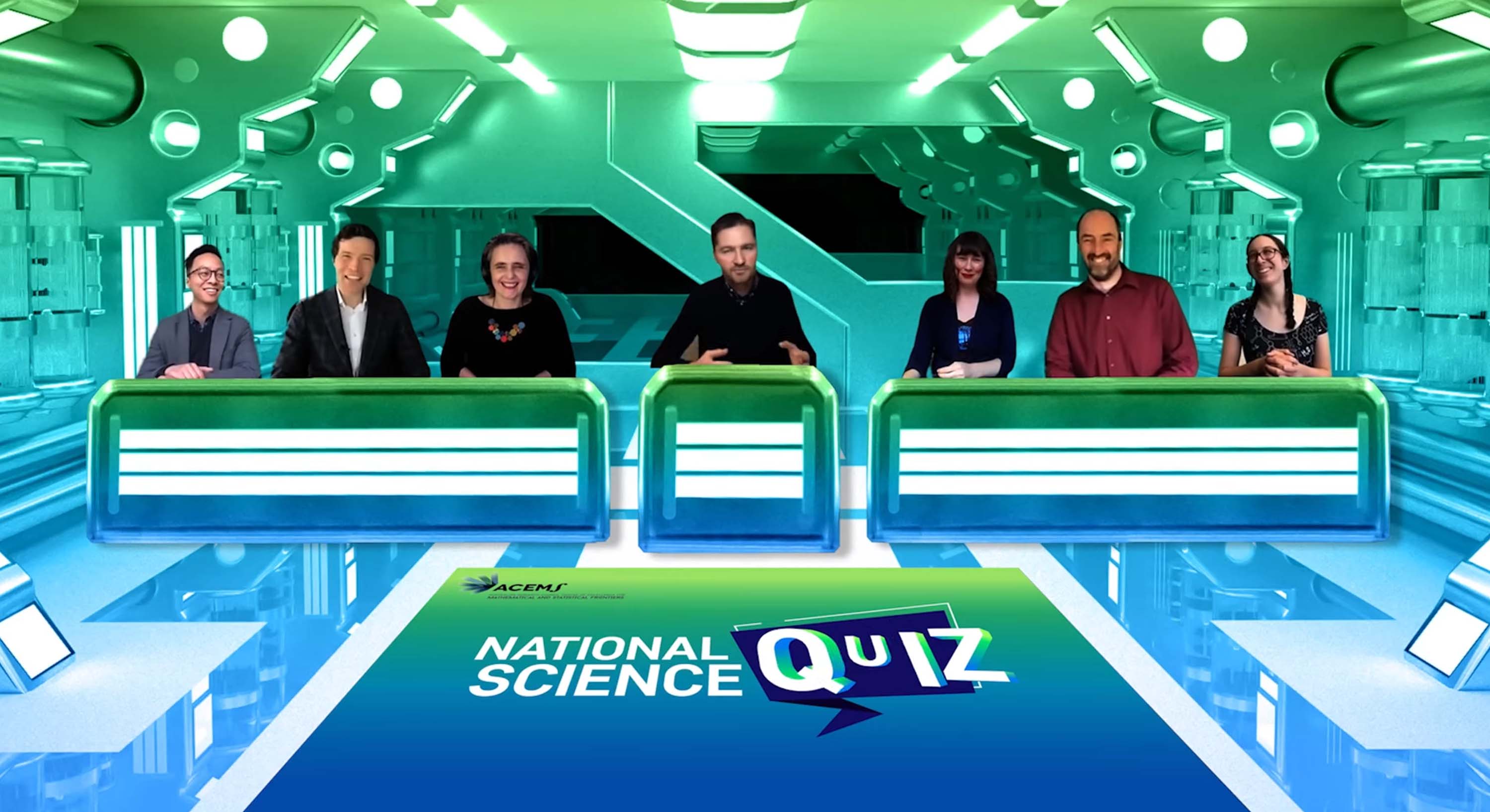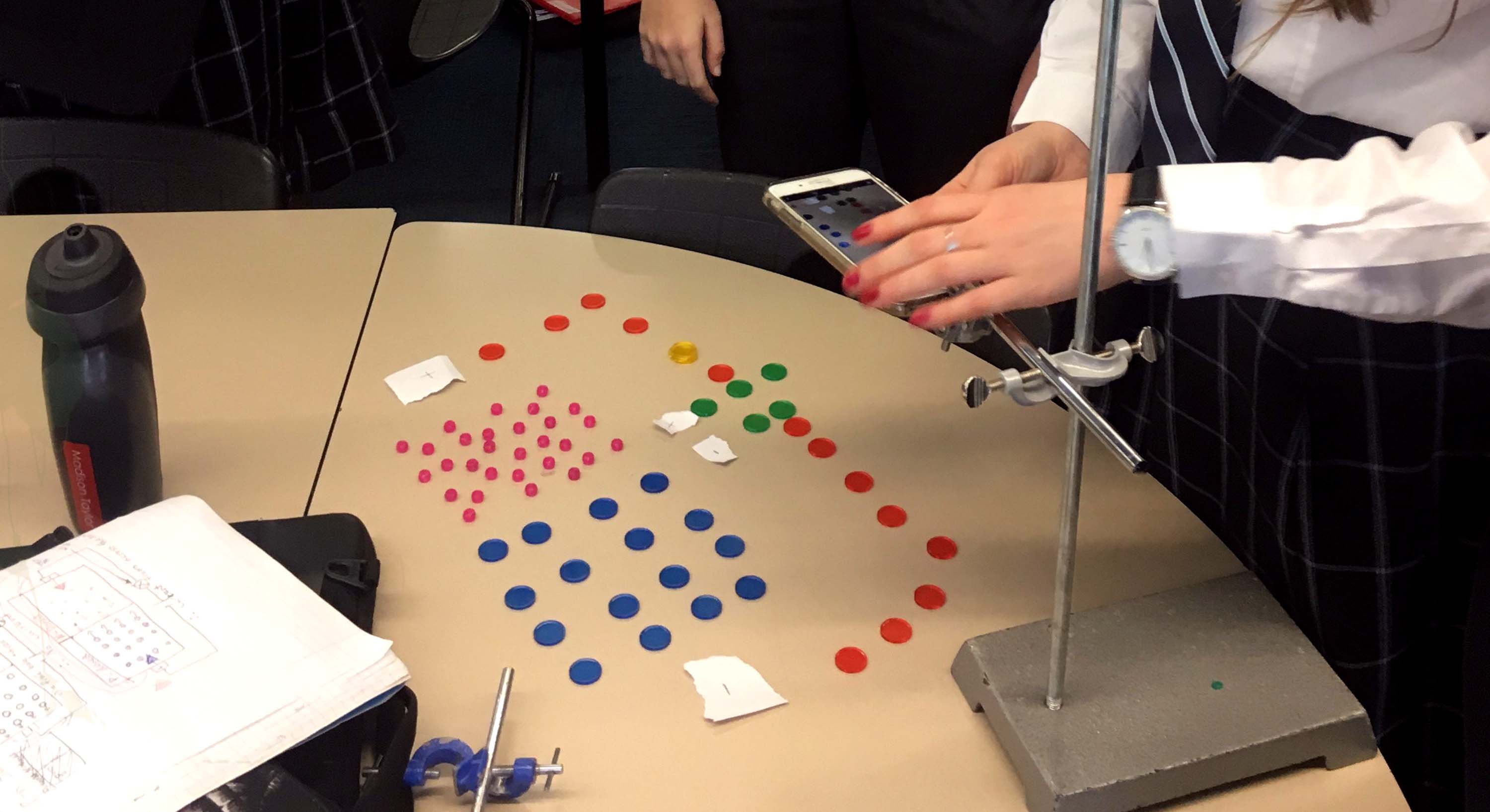Spreading a passion for science: Outreach
FLEET shares the responsibility to increase the participation of students in science, and to increase the number of girls and women participating in physics, chemistry and engineering.
FLEET’s outreach activities improve public awareness of FLEET research and scientific literacy among school students. FLEET members get a greater appreciation of their audience and their values and how to effectively communicate with them.
FLEET focuses significant efforts on science outreach, with the aim of:
- Increasing the participation of students in science and physics
- Increasing awareness, passion and appreciation for science in the general public
- Improving the outreach skills of FLEET members
- Facilitating public discussion of FLEET-specific research.
FLEET has an innovative and ambitious approach to outreach, with all FLEET members (from PhD student to director) required to do at least 20 hours of outreach each year. Members value outreach, seeing it as excellent training in science communications and a competitive advantage for their CVs.
FLEET’s outreach program also represents significant transferable-skills development, with members honing pitch and communications skills on students or public, and later applying the same skills in conversations with future collaborators or decision-makers.
In communicating with public I learnt that sometimes it's better to leave out information, if it helps get the message across. You don't have to explain the entirety of something for someone to get to grips with why it's useful, or important in the wider scope.
FLEET participant
Melbourne Knowledge Week
FLEET outreach highlights in 2021
- Engendering greater awareness of FLEET research at Melbourne Knowledge Week
- Inspiring students (particularly girls) to study physics with ongoing FLEET-JMSS Future Electronics unit
- Successfully road-testing atomic and electrical learning methods at Ashburton Primary School pilot.
In 2022 FLEET will…
- Build engagement in Ask the Physicists Facebook page
- Begin workshops for students and teachers using new teacher resources on light and electricity
- Develop a third teacher resource on energy
- Re-develop more home-science experiments towards use in classrooms
- Evaluate each outreach activity to understand impact on awareness and scientific literacy
- Target outreach to disadvantaged primary and secondary students
- Lead first year of new legacy committee for National Science Quiz
- Conduct science-based story time event for book week.
2021: Another challenging year for outreach!
Back in 2019, after a remarkable achievement in reaching over 10,000 students, FLEET voluntarily raised its outreach targets tenfold, to 2500 students, 75 teachers and 5000 public members.
These ambitious targets have certainly proven challenging with Covid subsequently causing the cancelling of most public events, and banning most in-class or in-lab visits.
However, FLEET remains extremely proud of our achievements in science outreach in 2020–21.
While Covid prevented in-person incursions to schools and excursion to FLEET labs, FLEET has developed new, in-depth teacher resources, beginning with a unit on light and optics, and another on conductors, insulators and electricity. The third teacher resource, on energy, will be developed in early 2022. A new, teacher-facing structure on the FLEET website improves access to these teacher- and student-based resources. FLEET.org.au/schools is now the ‘go to’ page of all outreach resources to schools.
Greater content depth and extra teacher resources have been added to FLEET’s home science series of experiments, which provide science opportunities for young children and adults, making science easy, accessible and relevant. Additional content includes worksheets, critical thinking exercises, graphics and explanatory videos. This effort will continue with other home-science experiments in 2022.
FLEET is leveraging social media to improve engagement with students and teachers via a new ‘Ask the physicists’ Facebook page where students’ and teachers’ questions are answered by FLEET members. The ‘Ask the physicists’ page is also a useful platform for updating followers about FLEET outreach and schools resources.
Three face-to-face events were conducted opportunistically between lockdown periods, with 13 FLEET volunteers meeting the public at Melbourne Knowledge Week (see case study), a FLEET presence at the John Monash Science School (JMSS) Immersion Day, and a ‘fireside chat’ briefing for end user community organisation the Melbourne Computer Club (see case study).
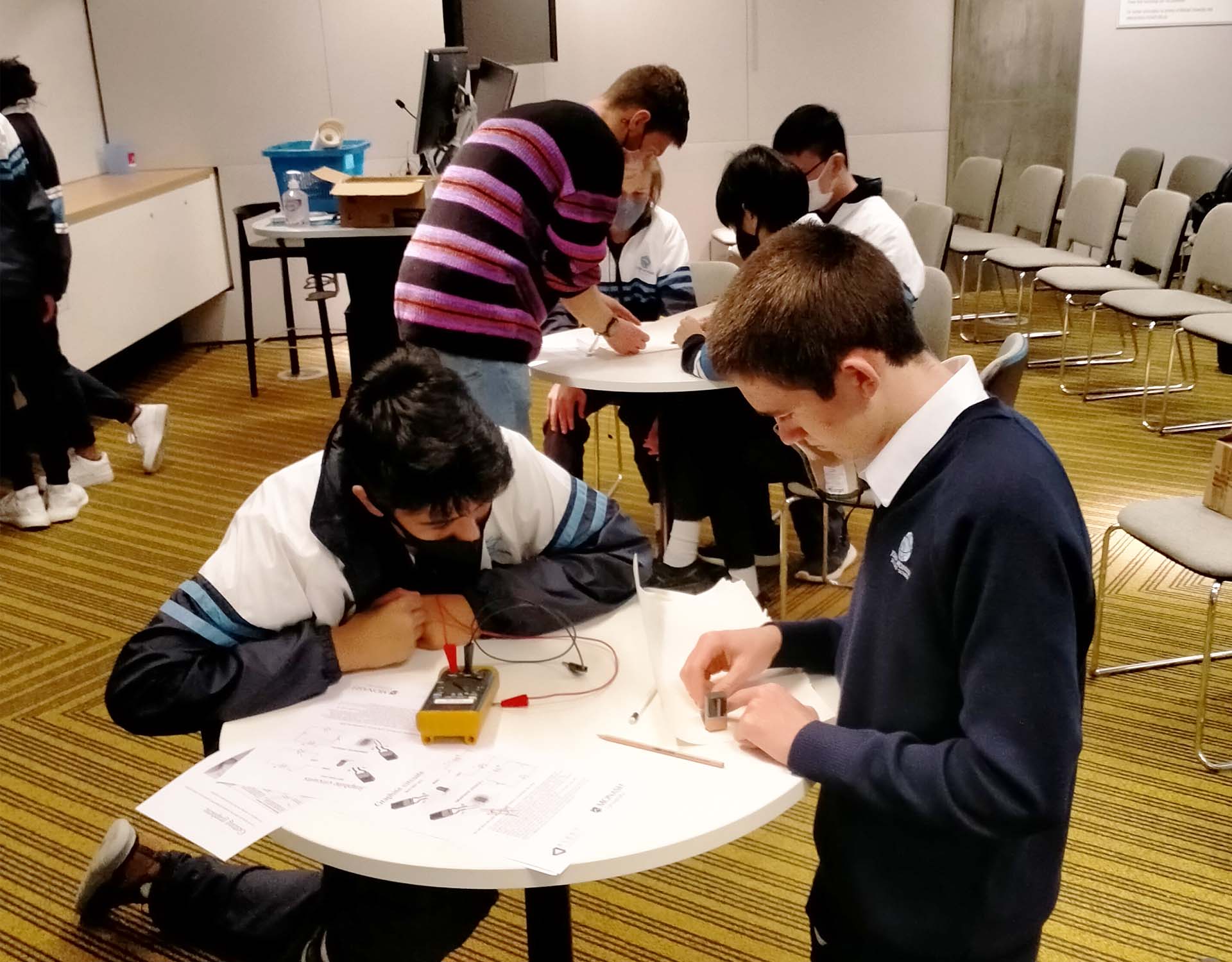
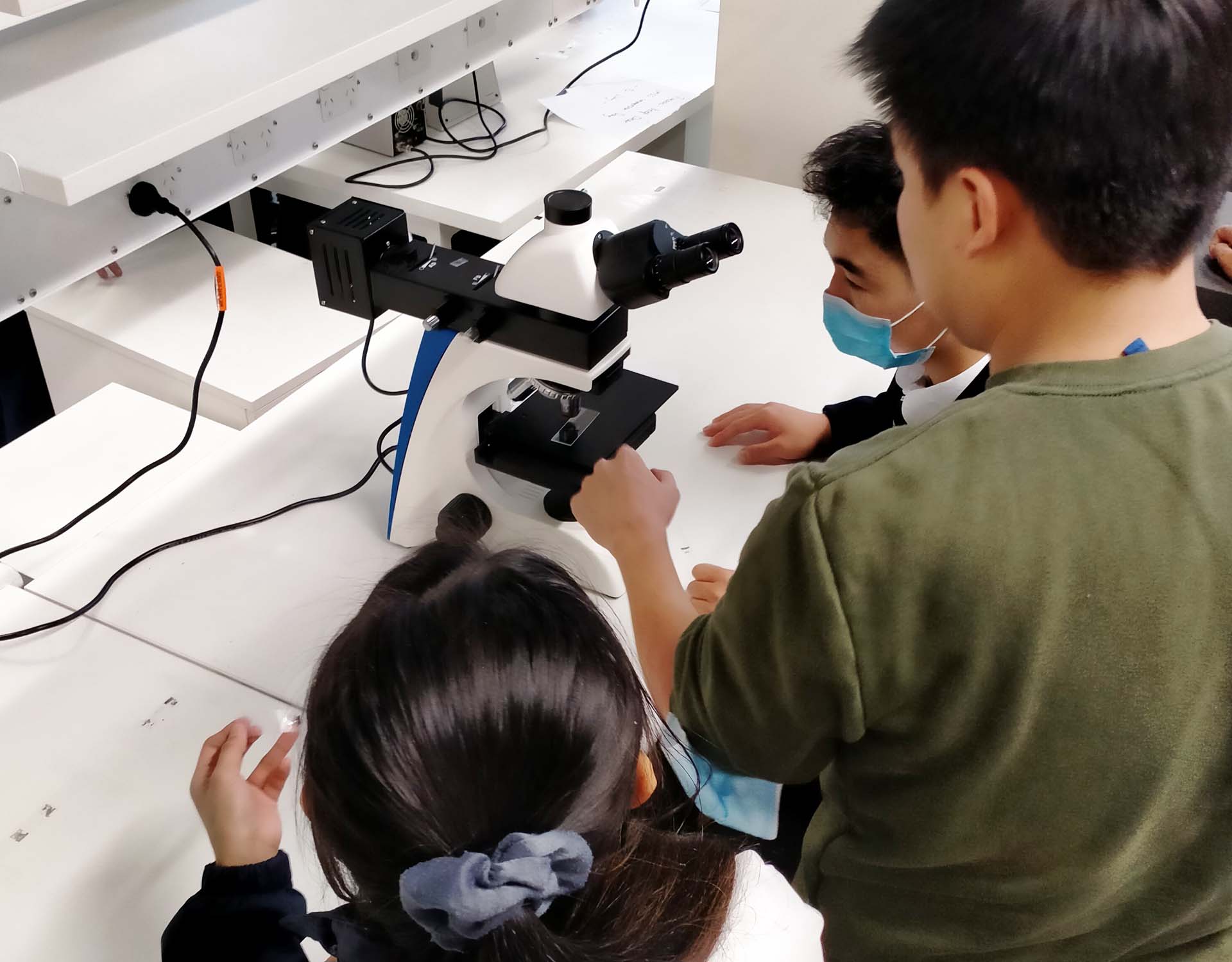
FLEET members running hands-on graphene exercises during JMSS Immersion Day
While some planned face-to-face events were cancelled (school incursions, work experience, Science in the City, and New Scientist Live), others could be moved online.
FLEET worked with the John Monash Science School to deliver the ongoing Future Electronics unit online, with FLEET presenters and teachers managing the significant challenge of engaging students at home. The first follow-up evaluation of this unit explored impact on past students, with encouraging results regarding engagement and female role models (see case study).
Also moving online, FLEET participated in the National Science Quiz, in collaboration with ARC Centres for Mathematical and Statistical Frontiers (ACEMS), Exciton Science, Gravitational Wave Discovery (OzGrav), Advanced Molecular Imaging, and Synthetic Biology, with Inspiring Australia.
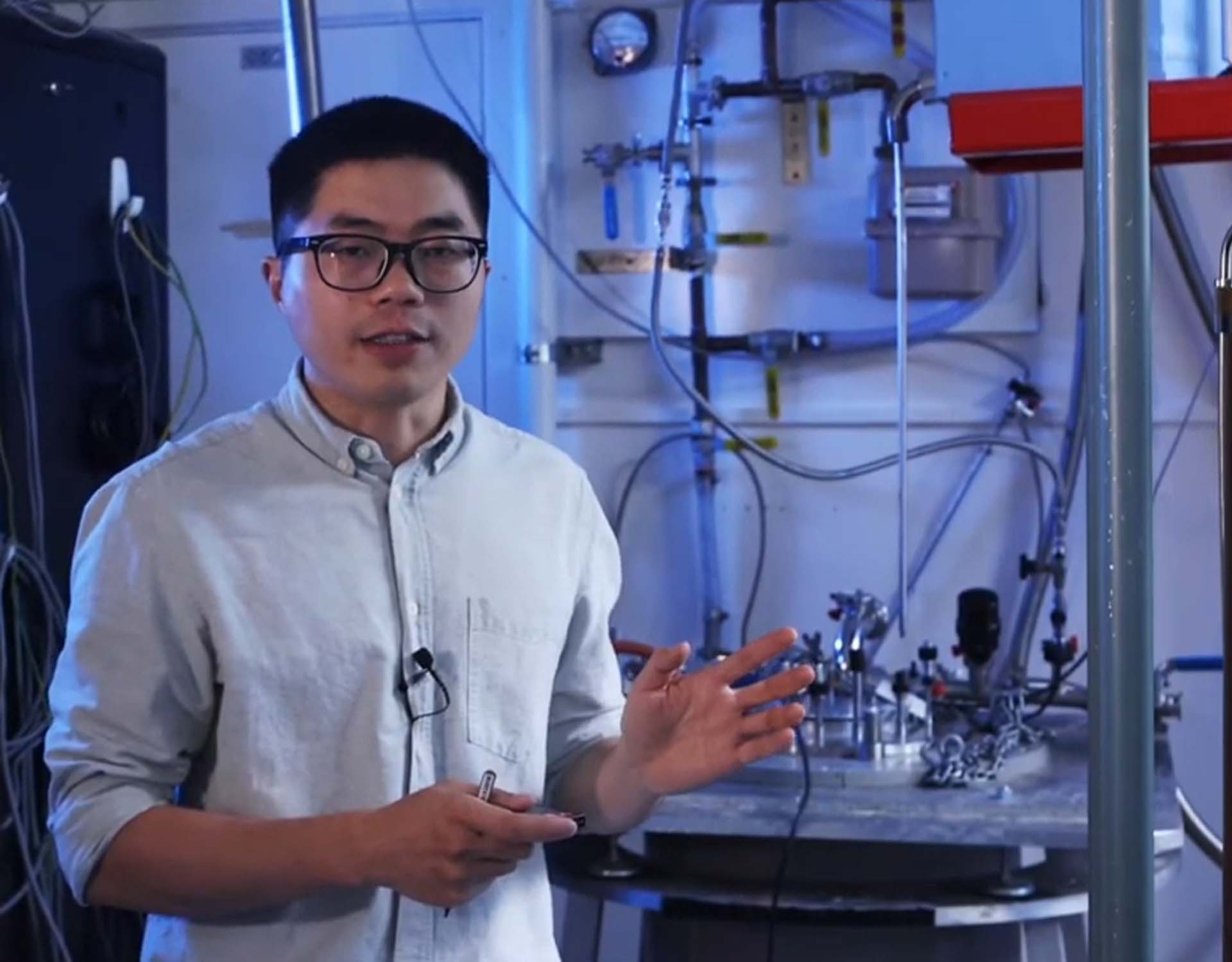
Explainer videos for scientific techniques build members' communication skills with 'higher level' science outreach
In 2021 FLEET piloted methods to evaluate the impact of online incursions to schools (see case study), which with minor improvements will provide valuable insights into the impact of FLEET outreach in science literacy and engagement.
To help members reach the Centre’s recommended 20 outreach hours per year while Covid posed such significant challenges, FLEET compiled and promoted a ‘suite’ of options, from writing sections for FLEET Schools, updating and adding depth to existing home-science experiments and developing new home-science content linked to the Australian school curriculum. While performing almost 1000 hours of outreach in 2021 (target 1500), FLEET members:
- Added new content to home-science experiments
- Fine-tuned their skills in science outreach and communication, including media training (see case study) and pitching to industry
- Presented their science in Three Minute Science (with FLEET’s Mitko Oldfield winning the Monash University competition) and Visualise Your Thesis
- Created a ‘video toolkit’ series of explainer videos for the facilities and techniques used by FLEET’s team at UNSW, including the most-useful tools in materials synthesis and study
- Wrote ‘tools of the trade’ articles describing scientific techniques for Nature, among 25 non-peer reviewed pieces of writing in 2021
- Explained their PhDs on radio for RRR show Einstein a Go-Go’s 20 PhDs in 20 minutes.
FLEET provides great numbers of interesting outreach opportunities, and therefore I can always find my preferred scopes to contribute in.
FLEET member survey response
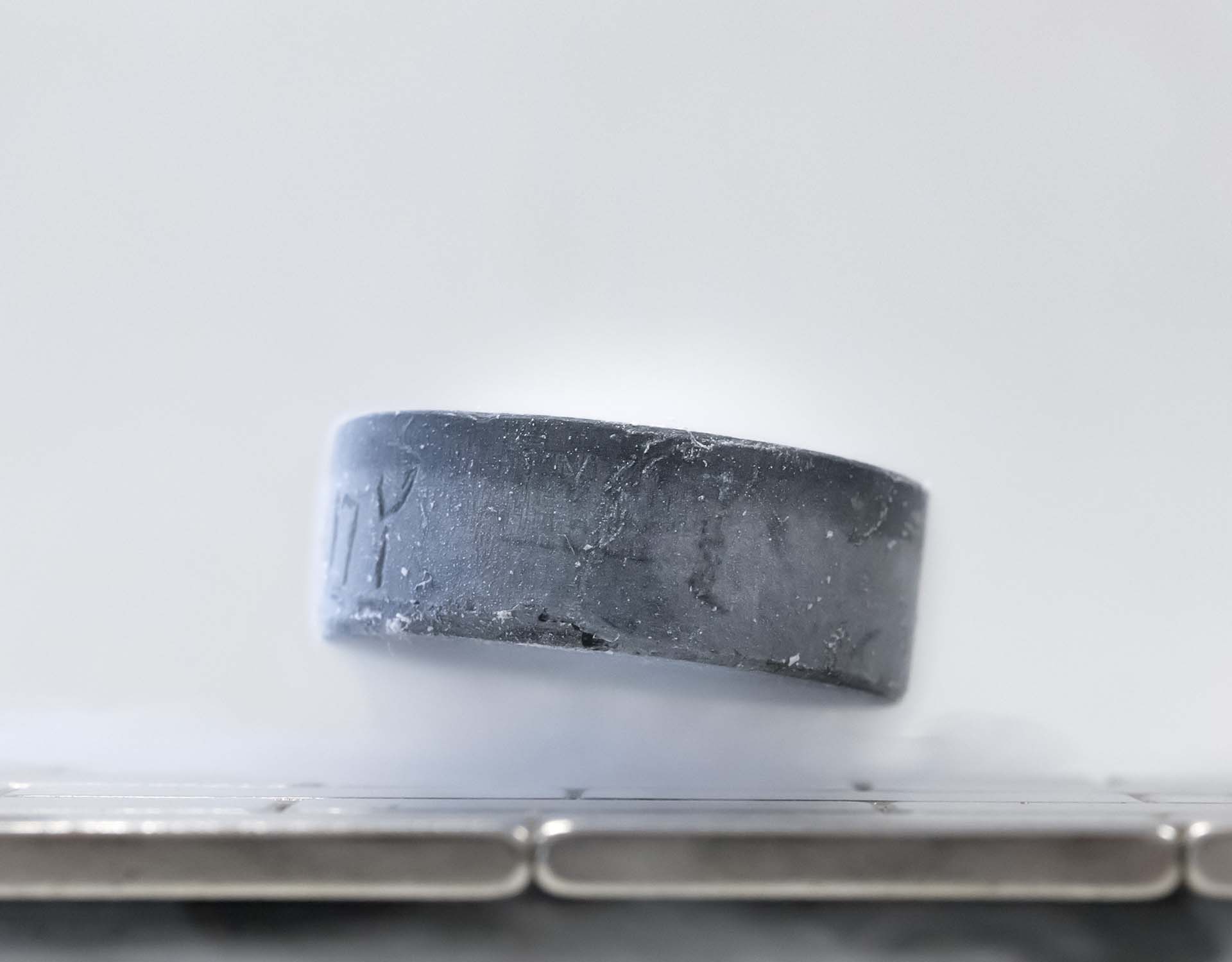
FLEET's superconducting mobius strip has been one of the Centre's most effective science outreach tools
Despite a year of Covid restrictions, FLEET directly reached 29 teachers against a target of 75 (not including teachers reached via new, teacher-oriented Facebook and online platforms). In addition the Centre reached almost 1000 school students (target 2500) and 3500 members of the public (target 5500).
As part of FLEET’s strategy to reach a wider audience, 12 FLEET volunteers have joined CSIRO’s STEM Professionals in School program that aims to bring science outreach to remote and regional schools and is commencing in 2022.
A team of five FLEET members are working on a new interactive exhibit, planning ahead for the resumption of public events. The portable laser-holograph machine will enable the public to help create, and then take home, a holographic image of themselves. A pilot demonstration is planned for early 2022.
FLEET outreach is unusual in that it is aimed at both improving science knowledge in the public (e.g. events facing general public and school incursions / excursions / videos) but also in improving members’ science-communications skills.
FLEET member survey response
FLEET will:
- Promote science literacy in schools
- Improve public awareness of quantum science, electronics and sustainable computing
Outreach with impact: Evaluating impact of FLEET’s outreach activities
FLEET’s public and schools outreach activities seek to promote public awareness and literacy of FLEET science by contributing to public scientific literacy, raising awareness and understanding of FLEET science among students and teachers, and improving public awareness of FLEET (and adjacent) areas of research.
But how do we know if we are achieving our objective? What impact are we achieving on awareness and literacy in our target audiences?
Evaluation is built into FLEET outreach: each outreach event is designed from the outset to allow evaluation, assessment and measurement against Centre goals.
Major outreach evaluation projects in 2021 included:
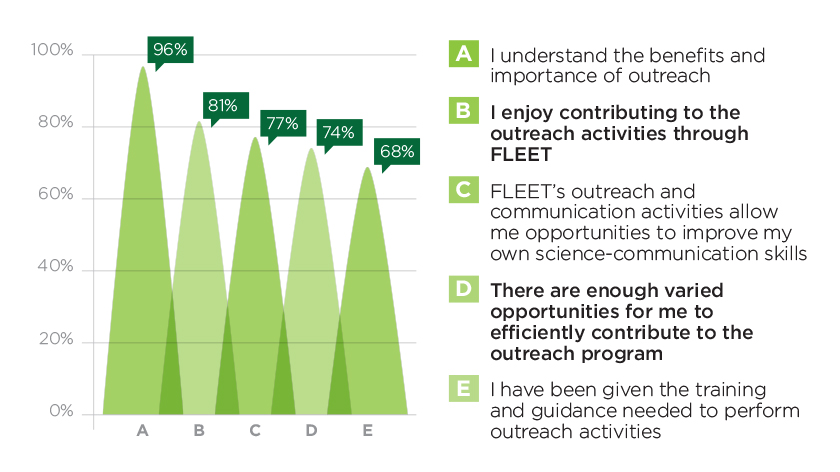
96% of members understand the benefits of outreach, according to the Centre’s 2021 Centre-wide survey
- Melbourne Knowledge Week Entry and exit surveying confirmed a positive effect on visitors’ appreciation and awareness of physics (see case study)
- Ashburton Primary School electricity and atoms workshop. Comparison of students’ understanding before and after hands-on exercises revealed the ‘surprising power of the periodic table’ (see case study)
- FLEET/JMSS Future Electronics unit Surveying found the unit positively affected students’ consideration of further physics studies, and that the participation of female scientists enabled female students to see a place for themselves in physics (see case study).
